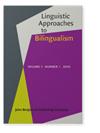Cognate facilitation in single- and dual-language contexts in bilingual children’s word processing
IF 1.8
2区 文学
0 LANGUAGE & LINGUISTICS
引用次数: 0
Abstract
Abstract We examined the extent to which cognate facilitation effects occurred in simultaneous bilingual children’s production and comprehension and how these were modulated by language dominance and language context. Bilingual Dutch-German children, ranging from Dutch-dominant to German-dominant, performed picture naming and auditory lexical decision tasks in single-language and dual-language contexts. Language context was manipulated with respect to the language of communication (with the experimenter and in instructional videos) and by means of proficiency tasks. Cognate facilitation effects emerged in both production and comprehension and interacted with both dominance and context. In a single-language context, stronger cognate facilitation effects were found for picture naming in children’s less dominant language, in line with previous studies on individual differences in lexical activation. In the dual-language context, this pattern was reversed, suggesting inhibition of the dominant language at the decision level. Similar effects were observed in lexical decision. These findings provide evidence for an integrated bilingual lexicon in simultaneous bilingual children and shed more light on the complex interplay between lexicon-internal and lexicon-external factors modulating the extent of lexical cross-linguistic influence more generally.双语儿童文字处理的同源促进作用
摘要本研究考察了同源促进效应在同时双语儿童的生产和理解中的作用程度,以及这些效应如何受到语言优势和语言语境的调节。从以荷兰语为主导到以德语为主导的双语荷德儿童,在单语和双语环境中执行图片命名和听觉词汇决策任务。语言语境是根据交流语言(与实验者和教学视频)和熟练程度任务来操纵的。同源促进效应在产生和理解过程中均存在,并与支配和语境相互作用。在单一语言环境下,儿童在非优势语言中对图片命名的同源促进作用更强,这与先前关于词汇激活个体差异的研究一致。在双语情境中,这一模式被逆转,表明在决策层面上主导语言受到抑制。在词汇决策方面也观察到类似的效果。这些发现为同时双语儿童的综合双语词汇提供了证据,并进一步揭示了词汇内部因素和词汇外部因素之间复杂的相互作用,这些因素更普遍地调节了词汇跨语言影响的程度。
本文章由计算机程序翻译,如有差异,请以英文原文为准。
求助全文
约1分钟内获得全文
求助全文
来源期刊

Linguistic Approaches To Bilingualism
Social Sciences-Linguistics and Language
CiteScore
3.20
自引率
9.10%
发文量
24
期刊介绍:
LAB provides an outlet for cutting-edge, contemporary studies on bilingualism. LAB assumes a broad definition of bilingualism, including: adult L2 acquisition, simultaneous child bilingualism, child L2 acquisition, adult heritage speaker competence, L1 attrition in L2/Ln environments, and adult L3/Ln acquisition. LAB solicits high quality articles of original research assuming any cognitive science approach to understanding the mental representation of bilingual language competence and performance, including cognitive linguistics, emergentism/connectionism, generative theories, psycholinguistic and processing accounts, and covering typical and atypical populations.
 求助内容:
求助内容: 应助结果提醒方式:
应助结果提醒方式:


